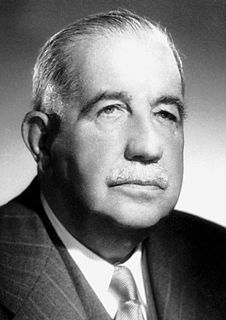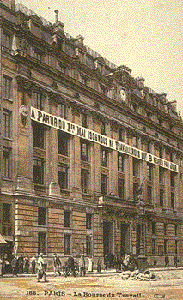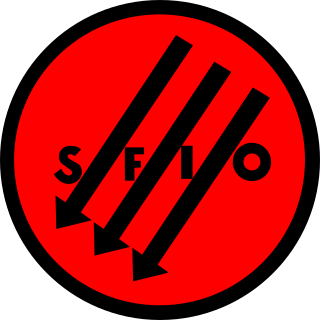Related Research Articles

The World Federation of Trade Unions (WFTU) is an international federation of trade unions. WFTU was established in 1945 to replace the International Federation of Trade Unions. Its mission was to bring together trade unions across the world in a single international organization, much like the United Nations. After a number of Western trade unions left it in 1949, as a result of disputes over support for the Marshall Plan, to form the International Confederation of Free Trade Unions, the WFTU was made up primarily of unions affiliated with or sympathetic to communist parties. In the context of the Cold War, the WFTU was often portrayed as a Soviet front organization. A number of those unions, including those from Yugoslavia and China, left later when their governments had ideological differences with the Soviet Union.

Léon Jouhaux was a French trade union leader who received the Nobel Peace Prize in 1951.

The General Confederation of Labour is a national trade union center, founded in 1895 in the city of Limoges. It is the first of the five major French confederations of trade unions.
The General Confederation of Labor - Workers' Force, is one of the five major union confederations in France. In terms of following, it is the third behind the CGT and the CFDT.

The French Democratic Confederation of Labour is a national trade union center, one of the five major French confederations of trade unions, led since 2012 by Laurent Berger. It is the largest French trade union confederation by number of members (875,000) but comes only second after the Confédération générale du travail (CGT) in voting results for representative bodies.

The General Confederation of Labor of the Argentine Republic is a national trade union federation in Argentina founded on September 27, 1930, as the result of the merger of the USA and the COA trade unions. Nearly one out of five employed - and two out of three unionized workers in Argentina - belong to the CGT, one of the largest labor federations in the world.

The Construction, Forestry, Maritime, Mining and Energy Union is Australia's main trade union in construction, forestry, maritime, mining, energy, textile, clothing and footwear production. The CFMMEU is affiliated with the Australian Council of Trade Unions, with the Australian Labor Party and with the World Federation of Trade Unions.
RENGO, which stands for Japanese Trade Union Confederation, is the largest national trade union center in Japan, with over six million members as of 2011. It was founded in 1989 as a result of the merger of the Japan Confederation of Labor (Domei) and the Federation of Independent Labor Unions. In 1990, General Council of Trade Unions of Japan (Sohyo) also joined RENGO.
A company or "yellow" union is a worker organization which is dominated or influenced by an employer, and is therefore not an independent trade union. Company unions are contrary to international labour law. They were outlawed in the United States by the 1935 National Labor Relations Act §8(a)(2), due to their use as agents for interference with independent unions. Company unions persist in many countries, particularly with authoritarian governments.

The Bourse du Travail, a French form of the labour council, were working class organizations that encouraged mutual aid, education, and self-organization amongst their members in the late nineteenth and early twentieth centuries.
The Charter of Amiens was adopted at the 9th Congress of the Confédération générale du travail (CGT) French trade-union, which took place in Amiens in October 1906. Its main proposal was the separation between the union movement and the political parties. The CGT was then dominated by anarcho-syndicalists who preferred the constitution of an alternate system through the elaboration of workers' union rather than moderate reforms through the electoral path. The motion for the Charter was drafted by Victor Griffuelhes, general secretary of the CGT, and Émile Pouget. The Charter was adopted by 830 participants, 8 having voted "no" and 1 abstained, and marked the victory of the current of revolutionary syndicalism in the CGT of the time.
Confédération africaine des syndicats libres, initially 'Confédération africaine des syndicats libres-Force ouvrière, was an Africa confederation of trade unions. CASL-FO was founded in February 1958 as the African sections of the French trade union centre CGT-Force Ouvrière separated themselves from their mother organization. The new union confederation was founded at a conference in Abidjan February 8–9, 1958, with participation of the CGT-FO branches of Senegal, French Soudan, Upper Volta, Niger, Ivory Coast, Cameroon, Moyen-Congo and Ubangui-Shari. At the time of the founding of CASL-FO, the relationship of the new structure with the International Confederation of Free Trade Unions (ICFTU) and CGT-FO, was debated. In the end the conference resolved that CASL-FO and CGT-FO should have membership of ICFTU on equal footing.

The French Section of the Workers' International was a French socialist party founded in 1905 and replaced in 1969 by the current Socialist Party (PS). It was created during the 1905 Globe Congress in Paris as a merger between the French Socialist Party and the Socialist Party of France in order to create the French section of the Second International, designated as the party of the workers' movement.
The Trade Unions International of Building, Wood, Building Materials and Industries, also known as the Trade Unions International of Construction, Wood, Building Materials and Industries, or by its French acronym UITBB is a Trade Union International affiliated with the World Federation of Trade Unions.

The Trade Unions International of Chemical, Oil and Allied Workers was a trade union international affiliated with the World Federation of Trade Unions. It was often known by its French initials, ICPS.
The National Federation of Building Trades Operatives (NFBTO) was a trade union federation in the United Kingdom, consisting of unions with members in construction and related industries.
The Clothing Federation was a trade union representing workers in the garment industry in France.
The Federation of Workers in the Book, Paper and Communication Industries is a trade union representing workers in the printing industry in France.
The National Federation of Chemical Industries is a trade union representing workers in the chemical industry in France.
The National Federation of Construction Workers was a trade union representing workers in the construction industry in France.
References
- 1 2 "FRÉOUR Louis". Le Maitron. Retrieved 29 April 2020.
- ↑ Ebbinghaus, Bernhard; Visser, Jelle (2000). Trade Unions in Western Europe Since 1945. Basingstoke: Palgrave Macmillan. p. 265. ISBN 0333771125.